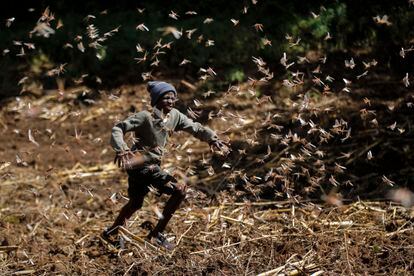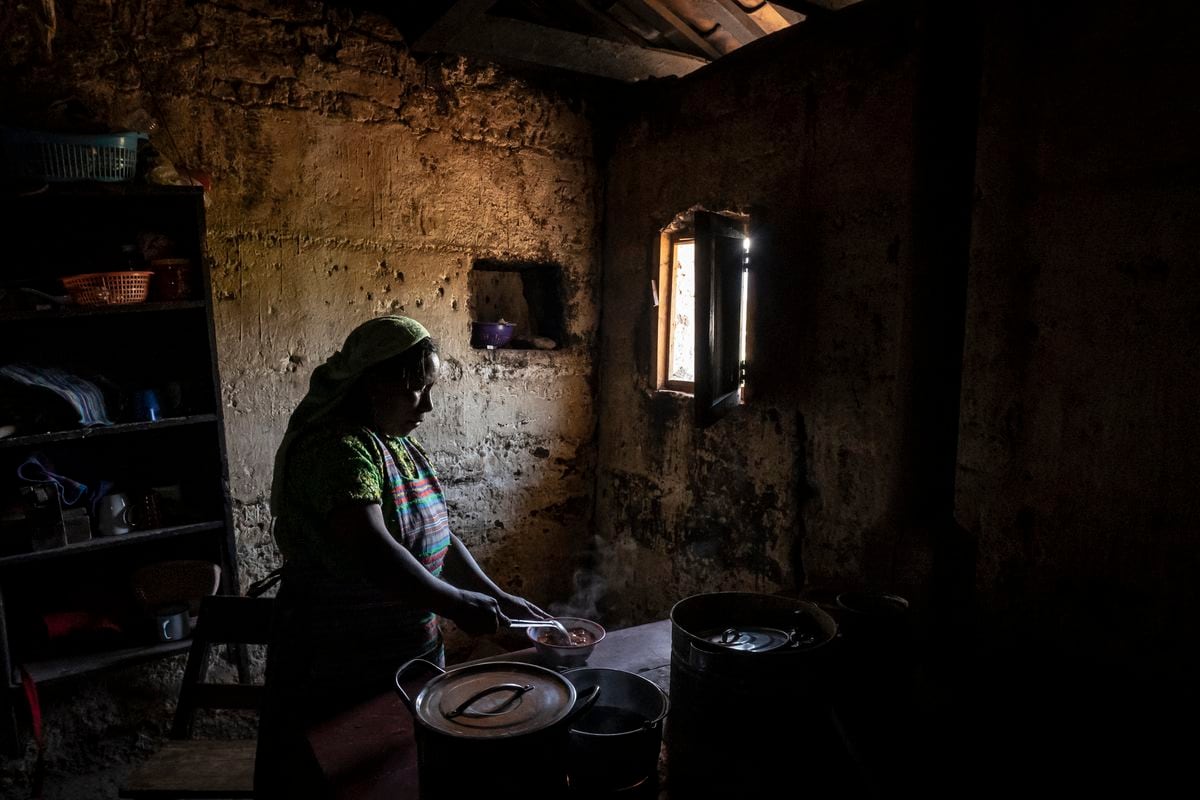With permission from the coronavirus pandemic and political agendas, three other topics have particularly interested the readers of Future Planet this year: conservation of the environment, climate change and preservation of wildlife is one of them, even before that COP26 in Glasgow put the spotlight on these issues.
There are a wide variety of topics in this ranking, but health in the broadest sense of the word and the situation of children stand out, as they have been deprived of their right to education or to healthy eating in many parts of the world. during these twelve months, if they had not already been suffering from it.
More information
20 milestones in global health in 2021 beyond covid-19
We challenge bad luck and reveal which have been the 13 most read reports of Planeta Futuro in 2021. As much as we review the audiences periodically, this annual list always brings surprises and never disappoints.
Thanks for reading and we are in 2022!
1. The forbidden meat that attracts everyone
It was March 2021 and we all already knew what kind of animal it is and what a pangolin looks like. This mammal had been accused, apparently unfairly, of being the origin, when consumed by humans in China, of covid-19. But the Asian country is far from the only one in which wild animals are eaten, with the risk it represents to health, since they do not pass any veterinary control and are potentially carriers of diseases. And we count the case of the Ivory Coast, which prohibits hunting and eating its meat, but not even for those are the pangolin safe. Dishes made with parts of this animal as well as rat or snake are popular on bar menus.
Emile Yapo, 60, lunches a plate of rat meat with cassava and spicy aubergine sauce at the Crinsh-Crinsh restaurant in the Ivorian town of Agou.Joost Bastmeijer
2. This is how the locust plague in Kenya is controlled
At the beginning of 2020, a plague that had not been seen in decades broke out in the Horn of Africa: billions of locusts crossed the borders of the Arabian peninsula, without passport or permission, and devastated land and fields, putting in It threatens the food security of up to 32 million people, as the UN Food and Agriculture Agency (FAO) warned at the time. The images were impressive. And in 2021, we are not forgetting the issue. A year later, the reporter Joost Bastmeijer, joined the team of this UN organization that was dedicated to fighting this insect in Kenya. The snapshots from the helicopter and the account of the activities hooked readers. Here you can read it again.
A boy runs among locusts in Nakuru County, Kenya.Brian Inganga (AP)
3. Lake Poopó in Bolivia dries up and scientists fear it will never be filled again
Third, another story about the dire effects of climate change.
This time, from Bolivia.
There we witnessed that the second largest lake in the Latin American country was left without water or life.
The inhabitants of the area, Aymara indigenous people, reported that the glass was filled every 50 years, but last August the experts predicted that this will never happen again.
01:54
The second largest LAKE in BOLIVIA has DRYED
4. What happened in the savannah when it was emptied of tourists
During the near-global confinement, imposed during the first months of the pandemic in 2020, humans watched from our windows as nature reclaimed space from asphalt.
Animals took to the streets, plants grew wild between the cracks.
But in the Masai Mara National Nature Reserve, in Kenya, the effect of the disappearance of tourists on wildlife would have gone practically unnoticed if a TVE team had not been accidentally trapped in that country, on that land.
In this report they shared their experiences and the images they recorded in those days, shortly before the premiere on the public channel of their documentary
Wild covid, pandemic savage.
02:25
Documentary intro 'Wild Covid', by Story Producciones
5. Mauritania: forced to gain weight
The photographer Carmen Abd Ali recreated in this gallery the testimonies of an almost unknown practice: the force feeding of young women to make them fat ... a lot.
They do it in Mauritania, where the beautiful woman is the one who is fat.
Many are forced to gain weight to be considered beautiful and suitable for marriage.
Accustomed to the contrary in the West - that extreme thinness is the ideal of beauty - this series of images showed, photo by photo, that the right of women to a life free of violence is undermined in very different ways depending on the geographical area and culture in which we put the focus.
Carmen abd ali
6. The boy from Senegal who made a telescope out of wire and soda cans
Amid grief over bad news related to the pandemic and other disasters, the story of 12-year-old Malick Ndiaye captivated readers.
Without sentimentality, his skill and intelligence left us speechless.
When he still could not read or write, instead of going out to play football with his friends, this Senegalese boy preferred to spend hours browsing an old book that was in his house, entitled
All the Universe.
Fascinated by these mysterious images of stars and planets, he made a functional telescope out of scrap materials.
The reporter José Naranjo was with him and his father at their home in Dakar, and was able to verify that the legend was totally true.
Malick Ndiaye, next to the telescope that he made with wire, soda cans and canes.José Naranjo
7. Dying Without Pain (2017)
When we were still counting daily deaths from COVID-19 by the hundreds, the audience returned to this article published in May 2017, in which we collected the findings of two publications regarding palliative care in sub-Saharan Africa and the eastern Mediterranean.
In summary: the people who inhabit these regions of the planet die in pain due to the limited use of drugs to combat it.
The saying goes that comparisons are hateful, but it is even more so to verify inequality in access to health, also at the end of life
In sub-Saharan Africa, one milligram of medicine is used per inhabitant per year, and in the eastern Mediterranean, 4.5 milligrams per capita per year.
The saying goes that comparisons are odious, but it is even more so to verify inequality in access to health, also at the end of life.
This 2021 we have witnessed the grabbing of the so-called
first world
of vaccines against covid-19, but it happened before.
The figures for the supply of drugs to avoid the suffering of the terminally ill in the two regions under study contrast with those of Europe, where the average use is 120 milligrams per person per year, and the gap is even greater with the recommendation of 200 milligrams recommended by the World Health Organization (WHO).
8. The Hidden Face of Child Pornography (2019)
A report published two years ago sneaks into this
Top 13
of
most read stories of Future Planet in 2021. The topic?
Child pornography.
It is impossible to affirm categorically the reasons that made this article circulate again, although readers returned to it at the same time that teleworking, online classes, the boom of virtual life as opposed to face-to-face life, constrained by the contagious new coronavirus.
Thus wrote the author:
“
It is estimated that the number of images of child sexual abuse is in the millions and that the number of victims is in the tens of thousands worldwide, according to the report
Child safety online: challenges and strategies world
of Unicef.
From the content analyzed and removed by the Internet Watch Foundation in 2017, it appears that 43% of the victims are between 11 and 15 years old and that 55% are 10 or younger.
It also shows that in 33% of the cases there was rape or torture ”.
9. Africa can also appropriate Spanish, shape it and take advantage of it
In the blog Africa Is Not A Country, Analía Iglesias echoed what was debated at the II Africa-Spain Meeting of Hispanists, which took place at the headquarters of the Instituto Cervantes in Madrid in November.
"Spanish is no longer the language of the Spanish," said Senegalese professor Ndioro Sow in one of the presentations.
We reproduce a passage from this article that was so interesting.
"
From the diaspora, our responsibility is to take care of what it means for us to speak these other languages, ”says Sam Daff. He then elaborates: “What is the genre in which we have to write? I think that we have justified ourselves so much for being African that this has permeated even the literature and it shows in the most recent immigration. The time has not yet come for the democratization of literature, to demonstrate our talent. Those of us who come bring a baggage and we express it not in the language of 'welcome', but in that of 'arrival'. I clarify this because all the terms have a value ... like talking about 'sub-Saharan Africa', when it would be more correct to talk about Africa sub-Sahara. Decolonizing minds means ceasing to believe that our cultures and languages are inferior.And this fight we cannot give more than us ”.
10. 23 inventions that can improve the lives of millions of people
A classic.
Every year, since its publication in 2015, this compilation of innovations is among the most widely read in the section.
This course, too.
In this article, the author, Pablo Linde, talked about how some water and salt lamps, cheap methods to make water drinkable, toilets that work with solar energy, low-cost incubators, a system of jugs to preserve food in the desert and another 18 inventions could transform for the better the existence of millions of inhabitants of developing countries where access to electricity, clean water, health or food is not fully guaranteed.
These two pots keep food fresh.
11. How the indigenous use medicinal plants to alleviate the symptoms of the coronavirus
It did not promise to cure or prevent covid-19.
That is up to the scientists.
Blanca Bonilla, an indigenous woman from Ecuador, created disinfectant gels using the herbs her mother used to ward off pests and improve respiratory diseases.
His initiative received the support of the local authorities and we told about it in October 2020. But since the pandemic has resisted leaving us alone this year, its story is among the topics that have most interested readers also in 2021.
Blanca Bonilla, an indigenous woman expert in medicinal plants from Ecuador, talks with Omar Vacas Cruz, ethnobotanist and independent researcher Omar Vacas Cruz
12. Charles Dickens' reaction to the diphtheria outbreak of 1856
A strange and dreadful disease is causing deaths around the world. Doctors are divided and it is difficult to establish an accurate picture of what is happening. Authorities are trying to avoid panic, travel has been interrupted and fake news is everywhere. We are not talking about covid-19 in 2021, but we go back to August 1856, when Charles Dickens took up his pen to write a letter to Sir Joseph Olliffe, a doctor at the British Embassy in Paris. In the letter, Dickens thanked the doctor for alerting him to the diphtheria outbreak that had occurred in Boulogne-sur-Mer, on the north coast of France, while the writer was there on vacation. In reality, three of his children were attending school in the region, and were preparing to start the new year.
Charles Dickens in his study in Gads Hill Place, England.
Engraving by Samuel Hollyer, 1875, Shutterstock / Everett Collection
13. Special One year without stepping on my school: “I haven't studied anything for a year.
I stay at home cleaning and cooking ”
Among all the experiences included in the special
A year without stepping on my school,
that of the Brazilian Stephany Rejani caught the readers. The 20-year-old recounted how her routine had changed due to the closure of schools for a whole year in Latin America. Before the covid-19 pandemic, she reconciled her studies in a public school, where she attends high school, with domestic jobs. But after the closure of the public educational centers, he abandoned all his studies to dedicate himself exclusively to the home. “I haven't studied anything for a year. I stay home all day cleaning and cooking. While my mother works, I take care of my brother, who is 12 years old, and my son, who is three, ”he said from Jardim Lapena, a neighborhood on the outskirts of São Paulo. The health crisis pushed her to fulfill a role that women have historically had to assume: that of housewife.
Stephany Rejani, 20-year-old Brazilian, reconciled studies with work, but stopped going to school as a result of the covid-19 pandemic Toni Pires
FUTURE PLANET can follow on
,
and
, and subscribe
here
to our 'newsletter'
.



/cloudfront-eu-central-1.images.arcpublishing.com/prisa/PCE7NMB26ZDVRIQX2R26JSNH6A.jpg)





